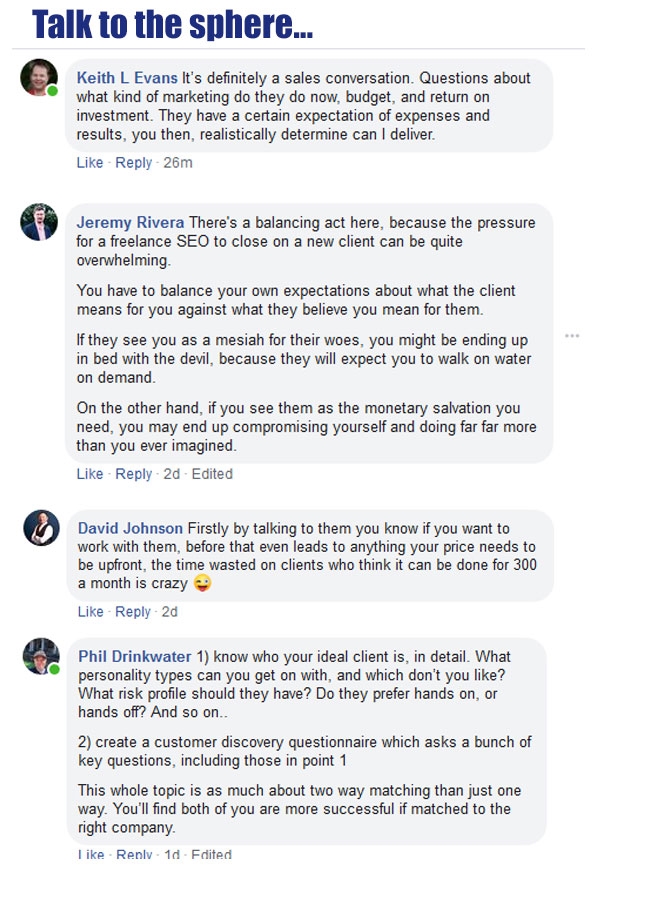Qualifying Clients
If you’re working at an agency, boutique or even freelance, which clients you take on can make a huge difference to not only the bottom line, the success of the contract, but your sanity as well. But it’s not always as easy, nor obvious, as it might seem.
If you’ve been in the game long enough, you’ve probably had some experiences that were less than ideal all the way to a complete horror show. So, how does one learn from that? How to we try to ensure a good fit and long-lasting relationship? Often this is dictated before you even begin via strong client qualification.
That’s what we’re going to get into today…

Limiting the offering
Obviously the first thing we want to consider are the types of contracts that you take on. More and more over the years, as SEO becomes more complex. Being a specialist over a generalist will help not only your own activities, but finding potential clients that best suit your particular talent set.
Consider a few different project types out there;
- Keyword target/strategy
- Audits (standard and forensic)
- Ongoing Programs
- Local V national/international
- Content strategy & development
- Link Building
As a freelancer you might want to consider specializing in fewer areas as it helps bring in potential clients that are more matched to your talents. And even as an agency, unless you have specialists on staff, it can also be wise to refine the offerings. This will ultimately help the sales team deal with prospects that are aligned to offerings you’re stronger in.
The Sales Process
The next thing to consider is the how/where you’re getting your leads. This will directly affect the types of leads that you’re getting and ultimately the quality of those leads.
- Networking/referrals
- Email campaigns
- PPC campaigns
- On-site contact
- Speaking (conferences, meet-ups etc)
- Visibility (social, writing etc)
- SEO (non-paid searches)
- Cold calling
A lot of folks say things like, “You’re an SEO, why aren’t you getting leads by ranking for SEO services and the like?”. The problem here is that those are often some of the lowest quality leads that can consume a TON of sales time. This can obviously lead to increased sales costs due to the time involved and lower conversion rates.
Regardless of the approach (or combination thereof) we tend to start the process off by trying to identify the needs of the situation. I am never a fan of cookie-cutter SEO approaches and as such the eventual proposal should be based on a variety of factors
These can include;
- Budget
- Resources (in-house)
- Existing data points
- Existing KPI/benchmarks
- Conversion points (primary and secondary)
- Potential ROI expectations
One thing I would generally advise is having a strong RFP form that they can fill out after the initial contact and prior to the first sales call. The more you know about the situation beforehand, the better the eventual sales call will go.
The pre-closing relationship
We also want to try, during the sales process, to understand the client and contact points. A lot of the success you’ll have is based on how well you and the client understand each other. And how well you get along. It stands to reason that a negative or even combative relationship isn’t going to be ideal for either of you.
Some considerations here can include;
- Business model (how well you understand it)
- The market (how well you understand it)
- Knowledge of SEO (how well the potential client understands it)
- Resistance to change?
- Relationship (gut feeling during sales calls)
Another common issue, that can be very hard to determine during the sales process are; micromanagers. I can’t count the number of times I’ve ended up in situations where the client hires you and then ends up trying to tell you how to do your job. Once more, these are hard to weed out, but do you best to identify these.
You also want to work toward managing expectations. It’s not exactly rare that you sell a project only to find out that the client didn’t fully understand what they were getting and what they were expecting from the relationship. Be sure that’s well discussed and ultimately spelled out in the contract.
The Desperation factor
Another common element that can lead to bad situations is the need for revenue (by the provider). This can happen to agencies and freelancers alike. Many times we can get ourselves into less-than-ideal situations because we have a need to bring in more cash. The freelancers know this one well, but even the agency might put too much pressure on salespeople to perform which can lead to cutting corners.
And this one might be one of the hardest ones to resist. Always try to remember that this pressure can often end badly. Don’t cut corners on the process.
Post-sales considerations
Ok, so you’ve closed the deal. So we just get about the work right? Nope. One of the more important parts to moving that relationship along is the in-take and project kick-off meetings. Try to get as much information related to the project as is possible. Also make sure that all the players (from the client side) are involved in the process to ensure everyone is on-board and ready to get things going.
At the end of the day you’ll still probably get into some less-than-ideal situations. As much as we try, it’s going to happen. And sometimes, it may not even be recoverable. Never be afraid to fire a client. It’s more than likely best for yourself and them as well. We’ve all been there.
Your Turn
This is certainly one area of the business side of SEO that can be as tricky as it is important. As with many elements in this ‘thing of ours’ experience is paramount. Today we just looked at some of the more high-level areas that can affect the process. It’s a starting point….
Next, I’d love it if you could share some of your own experiences in the comments. Below are some of the more interesting feedback I got from the community while crafting this piece.. be sure to give me some of your experiences and advice below as well (in the comments).

Until next time, stay frosty out there…
Digital & Social Articles on Business 2 Community
(50)
Report Post





